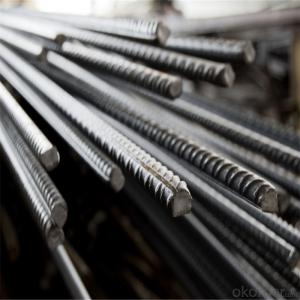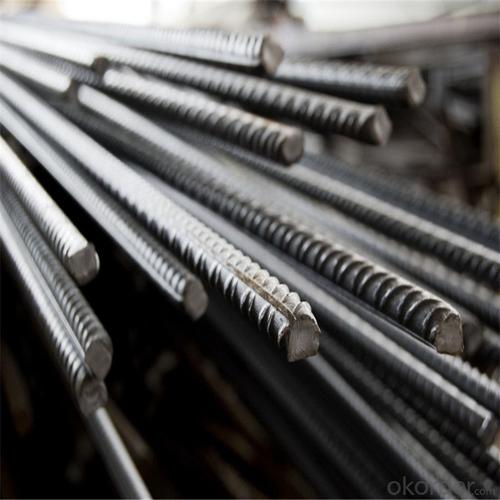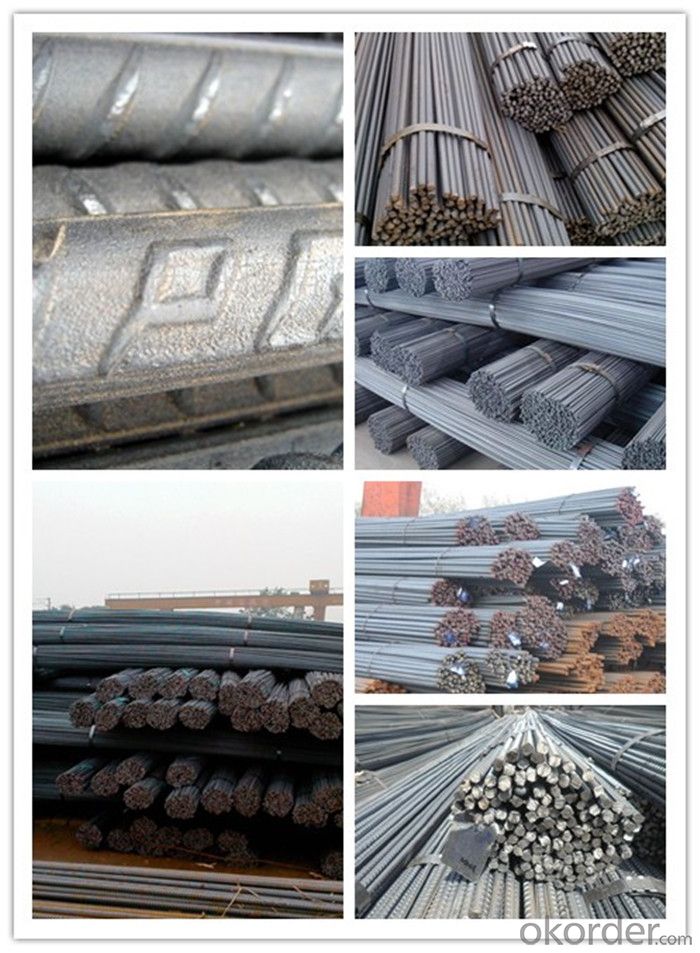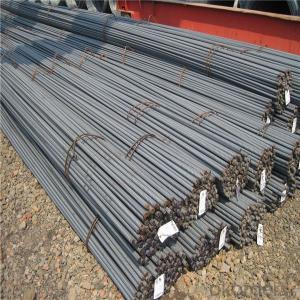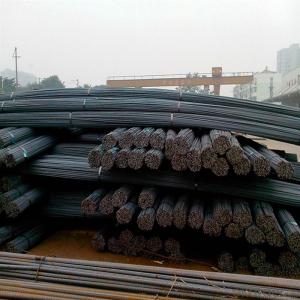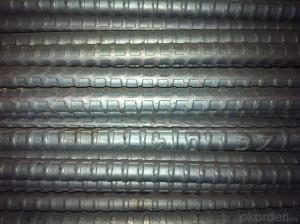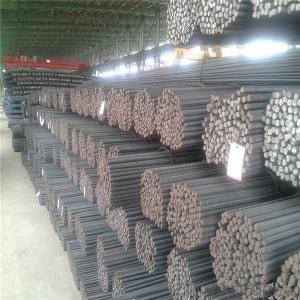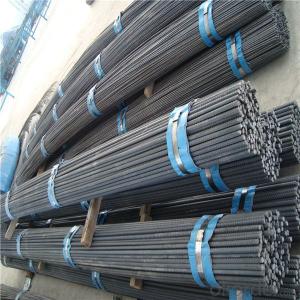12mm Steel Rebar Weight and Sizes
- Loading Port:
- Tianjin
- Payment Terms:
- TT OR LC
- Min Order Qty:
- 100 m.t.
- Supply Capability:
- 50000 m.t./month
OKorder Service Pledge
OKorder Financial Service
You Might Also Like
Specification
12mm Steel Rebar Weight and Sizes
Description of 12mm Steel Rebar:
1, Diameter: 5.5mm-10mm of 12mm Steel Rebar
10m- 40mm of 12mm Steel Rebar
2, Length: 6m, 9m, 12m or customized
3, Standard: GB, ASTM, AISI, SAE, DIN, JIS, EN
OEM technology - send detailed technical parameters for accurate quotation.
2, Produce Process: smelt iron - EAF smelt billet - ESR smelt billet -
hot rolled or forged to get the steel round bar and plate
3, Heat Treatment: annealing, normalizing, tempering, quenching
4, Surface Treatment: Black
5, Quality Assurance: We accept third party inspection for all orders.
You can ask testing organizations such as SGS, BV, etc. to test our products before shipping.
Chemical Composition of 12mm Steel Rebar:
Grade | Technical data of the original chemical composition(%) | |||||
Reinforcing steel bar HRB335 | C | Mn | Si | S | P | B |
≤0.25 | ≤1.60 | ≤0.80 | ≤0.045 | ≤0.045 | >0.0008 | |
Physics Capability | ||||||
Yield Strength(N/cm2) | Tensile Strength(N/cm2) | Elongation(%) | ||||
≥ 335 | ≥490 | ≥16 | ||||
Reinforcing steel bar HRB400 | C | Mn | Si | S | P | B |
≤0.25 | ≤0.16 | ≤0.80 | ≤0.045 | ≤0.045 | 0.04-0.12 | |
Physics Capability | ||||||
Yield Strength(N/cm2) | Tensile Strength(N/cm2) | Elongation(%) | ||||
≥ 400 | ≥ 570 | ≥ 14 | ||||
Product Show of 12mm Steel Rebar:
Company Information:
CNBM International Corporation is the most important trading platform of CNBM group.
Whith its advantages, CNBM International are mainly concentrate on Cement, Glass, Iron and Steel, Ceramics industries and devotes herself for supplying high qulity series of refractories as well as technical consultancies and logistics solutions.


FAQ:
1, Your advantages?
professional products inquiry, products knowledge train (for agents), smooth goods delivery, excellent customer solution proposale
2, Test & Certificate?
SGS test is available, customer inspection before shipping is welcome, third party inspection is no problem
3, Factory or Trading Company?
CNBM is a trading company but we have so many protocol factories and CNBM works as a trading department of these factories. Also CNBM is the holding company of many factories.
4, Payment Terms?
30% TT as deposit and 70% before delivery.
Irrevocable L/C at sight.
5, Trading Terms?
EXW, FOB, CIF, FFR, CNF
6, After-sale Service?
CNBM provides the services and support you need for every step of our cooperation. We're the business partner you can trust.
For any problem, please kindly contact us at any your convenient time.
We'll reply you in our first priority within 24 hours.
- Q: How is high-temperature stainless steel used in the production of gas turbines?
- High-temperature stainless steel is used in the production of gas turbines due to its exceptional heat resistance and corrosion resistance properties. It is utilized to make critical components such as turbine blades, rotors, and casings that are exposed to extreme temperatures and harsh environments. This stainless steel helps gas turbines operate efficiently and reliably by withstanding high temperatures without losing strength or degrading, ultimately enhancing the performance and lifespan of gas turbines.
- Q: How is heat-resistant steel used in the production of furnaces and boilers?
- Heat-resistant steel is used in the production of furnaces and boilers due to its ability to withstand high temperatures without deforming or deteriorating. It is specifically designed to retain its strength and structural integrity even in extreme heat conditions. This steel is utilized for components such as heat exchangers, tubes, and liners, ensuring efficient heat transfer and preventing damage to the equipment. Ultimately, heat-resistant steel plays a crucial role in enhancing the durability and performance of furnaces and boilers.
- Q: Can special steel be used in the aerospace industry?
- Yes, special steel can be used in the aerospace industry. Special steel alloys, such as stainless steel and titanium alloys, possess excellent strength, corrosion resistance, and heat resistance properties required for aircraft components. These materials are commonly used in critical applications like engine parts, landing gears, and structural components to ensure high performance and safety in aerospace operations.
- Q: What are the different types of special steel?
- There are several different types of special steel, including stainless steel, tool steel, high-speed steel, alloy steel, and carbon steel. Each type has specific properties and characteristics that make it suitable for different applications and industries.
- Q: Can special steel be used for precision instruments?
- Yes, special steel can be used for precision instruments. Special steel, known for its high strength, durability, and resistance to corrosion, is often used in the manufacturing of precision instruments such as surgical tools, watches, measuring devices, and scientific equipment. Its unique properties allow for precise and accurate performance, making it an ideal material choice for precision instruments.
- Q: What are the advantages of using special steel in the marine sector?
- Using special steel in the marine sector offers numerous benefits. Firstly, special steel is renowned for its exceptional strength and durability, which is crucial in an environment that constantly exposes structures to harsh and corrosive conditions like saltwater, extreme temperatures, and constant vibrations. The high resistance to corrosion that special steel possesses makes it the perfect choice for marine applications, as it can effectively endure the corrosive effects of seawater and prevent any structural damage. In addition, special steel provides outstanding weldability, a crucial characteristic when constructing marine vessels and offshore structures. The ability to seamlessly join steel components guarantees the overall integrity and strength of the structure, effectively reducing the risk of failures or accidents. Furthermore, special steel boasts a high fatigue strength, enabling it to withstand cyclic loading for extended periods without encountering failure. This is particularly significant in the marine sector where structures endure constant dynamic loads such as waves and wind forces. The fatigue resistance of special steel ensures the longevity and reliability of marine structures, resulting in reduced maintenance costs and enhanced safety. Moreover, special steel offers design flexibility and versatility. It can be effortlessly shaped and molded into intricate and diverse forms, allowing for innovative and efficient designs in marine structures and vessels. This flexibility also allows for weight optimization, a crucial factor in the marine industry for improving fuel efficiency and reducing emissions. Lastly, special steel is readily available and cost-effective. With advancements in manufacturing processes and technologies, the production of special steel has become more efficient and affordable, making it a viable choice for the marine sector. The availability and affordability of special steel make it the preferred material for various marine applications. To conclude, the utilization of special steel in the marine sector brings forth numerous advantages, including exceptional strength and durability, resistance to corrosion, excellent weldability, high fatigue strength, design flexibility, and cost-effectiveness. These properties establish special steel as a reliable and efficient material for constructing marine structures, ensuring their longevity, safety, and operational efficiency.
- Q: How does special steel perform in high-temperature oxidation?
- Special steel performs well in high-temperature oxidation due to its unique composition and properties. It exhibits excellent resistance to corrosion, heat, and oxidation, allowing it to maintain its mechanical strength and structural integrity even at elevated temperatures. This makes special steel suitable for various high-temperature applications, such as in power plants, automotive engines, and aerospace components. Its ability to withstand oxidation ensures long-term performance and reliability in extreme environments.
- Q: What are the mechanical properties of special steel?
- Enhanced mechanical properties are possessed by special steels, also known as alloy steels, in comparison to regular carbon steels. These properties differ based on the concentration and specific alloying elements. Some common mechanical properties of special steel are as follows: 1. High tensile strength: Special steels are recognized for their exceptional strength, making them suitable for applications requiring high load-bearing capacity. The tensile strength of these steels can vary from 500 MPa to over 2,000 MPa, depending on the composition. 2. Improved hardness: The inclusion of alloying elements in special steels can significantly increase their hardness. This property is desirable for applications that demand resistance to wear and abrasion. Special steels can achieve hardness levels ranging from 200-600 HB (Brinell hardness), depending on the specific alloy composition and heat treatment. 3. Good toughness: Special steels commonly exhibit good toughness, which refers to their ability to absorb energy before fracturing. This property is crucial for components subjected to impact or dynamic loading. The combination of high strength and toughness makes special steels suitable for demanding applications such as automotive parts or industrial machinery. 4. Excellent fatigue resistance: Special steels are engineered to withstand cyclic loading without failure. They display enhanced fatigue resistance, enabling them to endure repeated stress cycles without compromising their structural integrity. This property makes special steels ideal for critical components in the aerospace, automotive, and machinery industries. 5. Superior corrosion resistance: Depending on the alloy composition, special steels can offer improved corrosion resistance compared to regular carbon steels. The addition of elements like chromium, nickel, or molybdenum aids in the formation of protective oxide layers on the surface, preventing corrosion and increasing durability. 6. High temperature resistance: Certain special steels are specifically formulated to perform well at elevated temperatures. They possess excellent heat resistance and can retain their mechanical properties even under extreme temperatures. This property is crucial for applications such as turbine blades, exhaust systems, or high-temperature furnaces. It is important to note that the specific mechanical properties of special steel can vary significantly depending on the specific alloy composition, heat treatment, and processing techniques employed. Therefore, it is essential to consult the material specifications or seek expert advice to determine the exact mechanical properties of a particular special steel.
- Q: What are the main challenges in welding special steel?
- The main challenges in welding special steel include its high hardness and low ductility, which make it prone to cracking and distortion during the welding process. Additionally, special steels often have complex alloy compositions, requiring precise control over heat input and welding parameters to ensure proper fusion and avoid metallurgical defects. Furthermore, the presence of impurities and contaminants in special steel can negatively impact weld quality, necessitating thorough pre-weld cleaning and careful selection of filler materials. Overall, welding special steel demands specialized expertise, advanced techniques, and strict adherence to quality control measures to achieve successful and reliable welds.
- Q: How is tool steel different from other types of special steel?
- Tool steel is different from other types of special steel primarily because it is specifically designed to withstand high levels of stress and heat while maintaining its hardness and durability. It is specifically formulated to have high resistance to wear, abrasion, and deformation, making it ideal for cutting, drilling, and shaping tools. Unlike other special steels, tool steel has a balanced combination of properties like hardness, toughness, and heat resistance, which makes it suitable for use in various industrial applications where high-performance tools are required.
Send your message to us
12mm Steel Rebar Weight and Sizes
- Loading Port:
- Tianjin
- Payment Terms:
- TT OR LC
- Min Order Qty:
- 100 m.t.
- Supply Capability:
- 50000 m.t./month
OKorder Service Pledge
OKorder Financial Service
Similar products
Hot products
Hot Searches
Related keywords
